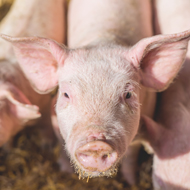Pig swill ban: poll looks at farmers' views

Illegal feeding of uncooked food waste to pigs was blamed for the devastating foot-and-mouth outbreak in 2001.
A poll of Farmers Weekly readers has shown that over three quarters of voters would support the reintroduction of pig swill feeding.
The online poll asked readers whether EU countries should legalise the feeding of heat-treated food waste to pigs. Out of 64 votes, 77 per cent chose the answer: 'Yes, land use would be reduced and farmers could save money.'
Meanwhile, just under a quarter voted: 'No, the risk of an outbreak outweighs the potential benefits.'
AHDB Pork said the results are 'out of step' with the opinions of British pig producers they have spoken to about swill feeding.
The poll was carried out in response to a recent study by the University of Cambridge, which found that lifting the EU ban on pig swill could cut feed costs by 50 per cent and save 1.8 million hectares of land.
Illegal feeding of uncooked food waste to pigs was blamed for the devastating foot-and-mouth outbreak in 2001, which is estimated to have cost the UK economy £8 billion. An EU-wide pig swill ban was subsequently introduced in 2002.
In light of their research, the team from Cambridge called for the pig swill ban to be reconsidered, prompting concern from organisations such as the BVA, National Pig Association (NPA) and AHDB.
An AHDB spokesperson is quoted by Farmers Weekly as saying: "The case for changing the legislation is well-intentioned but the potential savings gained by this would be negligible when compared to the potential cost of a disease outbreak."
A number of Asian countries, such as Japan and South Korea, however, use regulated systems for recycling waste food as pig feed, using heat treatment methods.
Cambridge researchers argued that a similar system in the UK could help to tackle the illegal feeding of food waste on smallholder farms. But Zoe Davies, NPA chief executive, does not believe this would be effective.
"Those that do flout the law do so because they don't understand the risk or think it wouldn't be an issue - forgetting some of these disease are airborne and how infectious they are," she told Farmers Weekly.
An AHDB spokesperson added that such a system would require "a complicated chain of steps" and very strict controls which would be "difficult to maintain".



 The latest
The latest